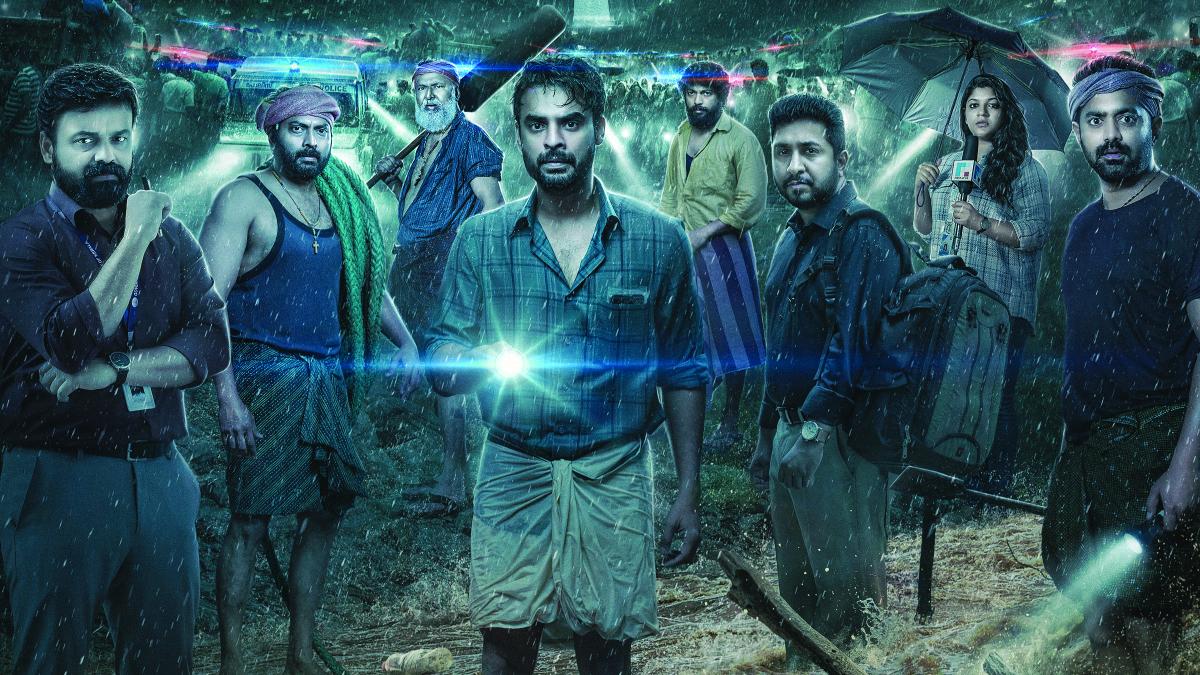
It’s a legitimate memory for children to grow up on stories of valiance. The stories and comics usually attribute bravery to kings and other strong and clever leading protagonists – usually male. It’s as if they never saw the need to convert the civilian prototype into a victor. Their job, as perceived through the stories, was to be saved. Who is a saviour? If we look at the concept through the lens of cinema, Hollywood may subtly put forward an idea of racial supremacy. Popular Indian commercial cinema would assert similar ideas but with an acute layer of casteism. In Jude Anthany Joseph’s Malayalam survival drama 2018, every person is a hero – a man, woman, or child. As the film effectively chronicles one of the biggest natural calamities in the history of Kerala (a state in Southern India), we come across human stories with a faint scent of blood, sweat and tears.
As the film opens, the mood is cloudy and tense. Tovino Thomas plays Anoop, a former Army man, awaiting his visa to UAE. Vineeth Sreenivasan is an NRI facing a troubled marriage with Gauthami Nair. Asif Ali is an upcoming model whose irresponsible ways irk his father (Lal) and brother (Narain). Kunchacko Boban is a front-line government servant who gets no time with his family. There are many more stories – of an enthusiastic vlogger couple from Poland, a family with a disabled child, a blind shopkeeper, a house-proud patriarch, a tourist guide, a reporter covering a water scarcity story in Tamil Nadu and a bitter resident who is out to take revenge against Kerala (in a nod to the pertaining Mullaperiyar Dam issue). In its 2.5-hour runtime, Jude Anthany Joseph packs in a riveting story that intersects each one of them (although not exactly in a conclusive fashion) to showcase human resilience like no other.
Although the 2018 flood was a state-wide calamity, the makers decided to set the story in Aruvikkara in southern Kerala. One that is home to people of all temperaments, religions and aspirations, the sleepy village is still a non-homogenous unit that is united by an unexpected strike of nature. A labour-intense film, Jude Anthany’s filmmaking prowess is profound. The technical aspects – especially the cinematography (Akhil George) and editing (Chaman Chakko) – are extraordinary thereby allowing the drama and images to keep you on tenterhooks throughout. The trauma faced by people of different needs and eccentricities is showcased in a minimal yet effective fashion.
ALSO READ: ‘Virus’ review – A masterful survival thriller that celebrates everyday heroes
2018’s execution, however, is often burdened by the screenplay (Joseph, Akhil P. Dharmajan) which plays too safe as it steers clear of controversies. The political angle behind the scenes (from the central and the state governments) gets a negligible mention. The film abounds in an array of characters and not all of them get their stories closed. We never know what happened to Vineeth and Gautami’s mysterious marriage. Aparna Murali’s journalist, too, is more smoke than fire. While it’s a matter of joy to see many veteran artists appear, not many of them get the due they deserve. There’s also a permanent layer of saccharine sweetness which, although I didn’t mind, does tone down the film’s other high points a little.
For a film that rides heavily on performances, 2018 comes with a mixed bag. The more experienced and popular names are stellar throughout – Lal, Tovino, Kunchacko, Sudheesh, Asif Ali, and Narain are superb – in that order. Sshivada grabs a scene-stealing moment, and she knocks it off the park. Indrans essays a token blind man with a permanent halo over his head whereas the Vineeth Sreenivasan-Kalaiyarasan track is a tad melodramatic even though the actors are excellent. We also get a police superintendent who speaks like a boisterous news reader and a male Polish tourist who got all his references wrong.
High on VFX, 2018 also does a fantastic job at melding real and filmed footage. The atmosphere feels authentic, and the credit goes into the original score (Nobin Paul) and audiography (Vishnu Govind) departments that are exemplary. Kudos to Jude Anthany Joseph and the team for creating a dystopian world from scratch that probably the rest of India wouldn’t have imagined. 2018 elucidates how all the exotic Kathakali and houseboat visuals, there’s also a grim, brave face to the God’s Own Country. Without an iota of doubt, this heart-wrenching journey of humanity and survival is the ‘Kerala Story’ the nation needs to watch today. If only the film was supported by a solid marketing campaign and, of course, a catchier title.
Rating: ★★★ 1/2

